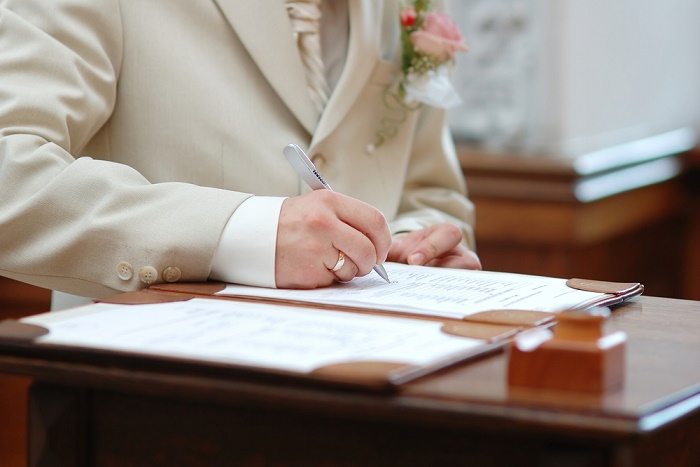Alabama Judges Use Jim Crow-Era Law to Halt Same-Sex Marriage Licenses
A state law passed in 1961 makes the issuance of marriage licenses optional rather than mandatory.

Alabama judges are using a Jim Crow-era law to avoid issuing marriage licenses to same-sex couples. That law, passed in 1961, makes the issuance of marriage licenses optional rather than mandatory.
Two Alabama legislators, F. LaMont Glass of Greenville and H.B. Taylor of Georgiana, introduced a law that was intended to revamp Alabama’s marriage law, as reported by the Associated Press. Prior to the unanimous passage of Glass and Taylor’s bill in 1961, couples were required to obtain a marriage license in the county where the woman lived, or in the county where the couple planned to wed.
The new law got rid of that requirement. It also made the issuance of marriage licenses optional: “Marriage licenses may be issued by the judges of probate of the several counties.”
It is unclear what motivated Glass and Taylor to sponsor the new marriage law in 1961. Alabama lawmakers stalwartly opposed integration by any means necessary. In 1963, two years after the passage of the marriage law, Alabama Gov. George Wallace would physically block two Black students from entering the University of Alabama.
But considering that in 1961, Alabama’s constitution already forbade interracial marriage (that provision was repealed in 2000), it’s difficult to understand why Glass and Taylor would pass a law designed to give judges an out when it came to issuing marriage licenses to interracial couples. They already had a constitutional out. Former Alabama Gov. Al Brewer, who was a House member in 1961, said that neither Glass nor Taylor was a hard-core segregationist, and speculated that the law may have been passed as a favor to judges who didn’t want to be bothered with issuing marriage licenses, according to the AP.
That law is now being used to give judges an out when it comes to issuing same-sex marriage licenses. A handful of judges are refusing to issue any marriage licenses at all, since the law states that marriage licenses “may” be issued, not “shall” be issued.
One probate judge, Nick Williams, who serves in Washington County, is opposed to same-sex marriage and claims that issuing marriage licenses to same-sex couples would violate his religious liberty. “It is a religious freedom issue, but more than that, I believe it is a constitutional issue,” he said, according to the AP.
He said that he would be willing to go to jail like Kentucky clerk Kim Davis, who spent a weekend in jail for failing to obey a court order requiring her to issue marriage licenses to same-sex couples.
Williams, who is a Baptist minister, asked the Alabama Supreme Court last month for a protective order that will shield him and other probate judges who refuse to issue marriage licenses to same-sex couples.
Two other judges in adjoining counties have also refused to issue any marriage licenses. There is now a region in southwest Alabama that is home to 78,000 people who are unable to obtain marriage licenses without driving up to two hours to obtain one from a county that is still issuing them.
One couple, Daniel Hopkins and Whitley Jones, reportedly drove 40 miles to obtain a marriage license from Williams before they found out that Washington County no longer issues them. The couple then had to drive 62 miles to the probate office in Mobile, which is issuing licenses pursuant to a federal court order.
The Alabama Supreme Court has not yet ruled on Williams’ request for a protective order and it is unclear how the court will act. The Chief Justice of the Alabama Supreme Court, Roy Moore, is a vocal opponent of same-sex marriage.
In February, when a federal court ruled that Alabama’s ban on same-sex marriage was unconstitutional, Moore ordered probate judges in Alabama to defy the federal court order and stop issuing marriage licenses to same-sex couples. After the Supreme Court’s ruling on June 27 in Obergefell v. Hodges, Moore told CNN that the ruling was worse than the Supreme Court’s ruling in Plessy v. Ferguson upholding racial segregation.
